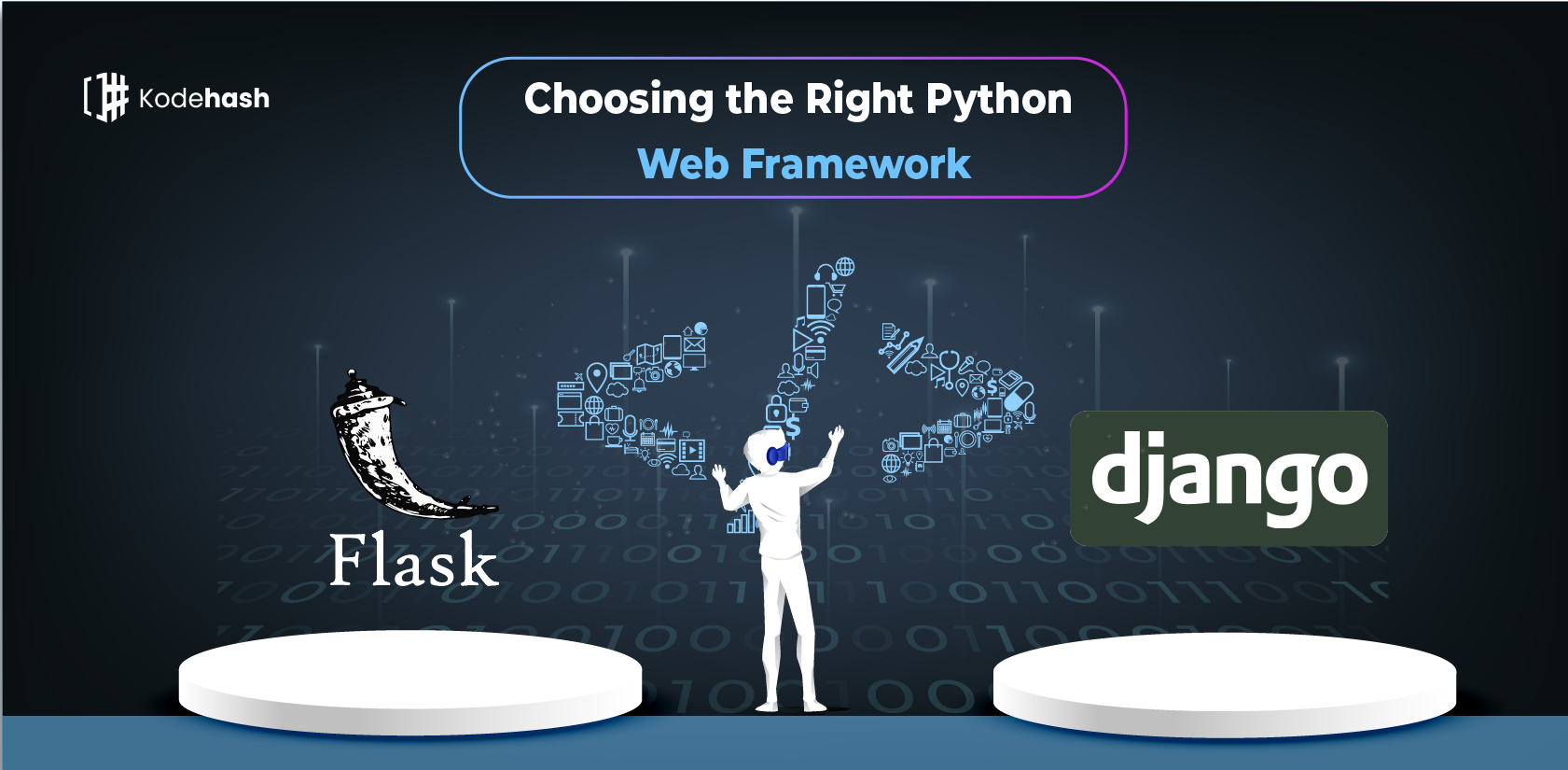Which Frameworks Should be Considered Between Flask and Django?

In the Flask vs Django debate, both of them are the most famous Python web frameworks designed to ease code complexity for developers. Flask emerged as an alternative to Django providing enhanced flexibility in implementation choices while Django maintains module integrity. If you too are confused between choosing the most appropriate one for your next web application development project, honestly, then you might hardly go wrong with either framework. Both are extensible, mature web frameworks, offering similar functionality in handling requests and serving up documents.
However, both of these frameworks differ in their scope of responsibilities. So, let’s talk about Flask vs Django and which one is the right framework of web development.
All About Django
Introduced in 2003, Django is a Python-based open-source framework used to design web applications. Django is a high-level web framework used to complete the web development process faster and efficiently. Django is a free source and comes with more features ensuring better performance. Django is being used by many developers as it enables them to use it for standard functionalities having limited interference of systems, protocols, and management.
Some of Django’s basic development functions include site maps, content organisation, client information, to name a few. This framework focuses on completing the application at the earliest. Companies using Django include Instagram, Coursera, Mozilla, Pinterest, Spotify, Udemy, etc.
Main Features of Django
A few of the main features of Django are as follows:
- Fast: From concept to final development process, Django working process is indeed fast.
- Dynamic: Django is a dynamic framework enabling developers to work on various platforms. From WordPress, to social network platforms such as LinkedIn, YouTube, etc., Django works well on all.
- Adaptable: Django is fully compatible with various formats such as JSON, HTML, XML, and many more.
- Scalable: This framework ensures scalability and lets developers make changes in different layers and make quick updates. Also, the code can be reused and maintained properly.
- Secure: Django comes with in-built dynamic authentication systems and protocols that help avoid clickjacking, unauthorised access, cyberattacks, etc.
- Portable: Since Django is a Python-based framework it is highly portable.
All About Flask
Flask is another popular Python-based microframework used for web application development. Introduced in 2011, Flask is categorised as a micro framework due to its non-dependency on external libraries while completing the tasks of a framework. This framework comes with various tools and technologies supporting the overall app’ functionalities. Due to being more independent and flexible, Flask is preferred by many developers globally. Companies using this framework include Netflix, Airbnb, Reddit, Zillow, Mozilla, etc.
Main Features of Flask
Key features of Flask include:
- Independent: With Flask, developers get freedom to create applications letting them experiment with the architecture or the libraries of the framework.
- Supports multiple types of databases: Flask supports different kinds of databases by default as it has no default model. This makes integration easy and fast.
- Compatible: Flask is fully compatible with advanced technologies such as Machine Learning, Cloud, etc.
- Flexible and Scalable: Flask is preferable for those who look to create a simple web app with just a few static pages. Many programmers find Flask more scalable for smaller web applications.
Difference Between Flask and Django
Admin Interface
Django has a ready-to-use admin system, simplifying extended administrative tasks. Unlike Flask, Django’s system automatically generates admin modules, offering customization for specific business needs.
Database
Django supports the ORM framework, letting developers work seamlessly with different kinds of databases. In contrast to this, Flask requires developers to use SQLAlchemy for common database operations, lacking native ORM support.
Built-in Template Engine
Flask is based on the Jinja2 template engine, influenced by Django’s engine. While Django comes with a built-in template engine for smooth creation of user-facing layers in web applications.
Project Structure
In Flask vs Django, Django has a specific project structure which ensures consistency in larger teams or projects. While Flask allows developers to organize their code in a more useful way.
Use Cases
Django is ideal for designing large, complex web applications that need many in-built features like content management systems (CMS), e-commerce platforms, and social networks. While Flask is ideal for small-to-medium-sized projects and APIs. Flask gives freedom to developers to choose the libraries and components as per their specific needs.
When to Use Flask?
Some of the cases to use Flask are:
- When you start building everything from scratch and want no dependencies, then the Flask Python framework is the ideal option for being highly flexible.
- In case you want to design robust microservices, use Flask.
- For building static websites, MVPs, RESTful web services, rapid prototypes, Flask is an ideal option.
When Use Django?
Here are some of the use cases of Django:
- Use the Django framework while building dynamic APIs with the REST framework or dynamic social networking websites.
- For building enterprise-level, data-driven applications with advanced personalization features, Django is preferable.
- When you want to build web apps with ORM support without integrating high-end technologies like Machine Learning in the future, it is an ideal option.
Final Words
As discussed earlier, the selection between Python Flask vs Django completely depends upon the project’s requirement. You can use a combination of them depending on your business needs.
In case you want to integrate the right framework for your existing or upcoming project, connect with a proficient tech partner like Kodehash Technologies that deploys the best framework based on your business needs. Based on the requirements finalised, the experts will choose the right framework.
Request a demo or reach out to our experts to discuss the framework that fits your project seamlessly.
Recent Blogs
Subscribe:
Subscribe for the newsletter and receive email notification of every future post.




